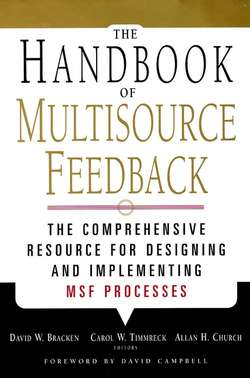Описание книги
The Comprehensive Resource for Designing and Implementing MSG Processes As organizations strive to make the best possible decisions on critical issues such as compensation, succession planning, staffing, and outplacement, they have increasingly turned to multisource feedback (MSF) for answers. But while use of MSF (or 360-degree) systems has proliferated rapidly, understanding of its complexities has not—and many companies are moving forward with MSF amid a dangerous void of systematic research and discussion on this powerful process. The Handbook of Multisource Feedback provides the most comprehensive compendium available of current knowledge and practice in MSF. The volume's diverse group of contributors—which includes renowned academics, practitioners, and applied researchers—represents the acknowledged thought leaders in the current and future practice of MSF. Through their multiple perspectives, they identify best practices in the design and implementation of MSF processes and offer key guidelines for decision making when using MSF The book offers solid grounding in the nuts and bolts of MSF data collection and reporting, providing a process model that leads the reader step-by-step through each phase of an MSF system. It details the developmental and decision-making uses of multisource feedback, describing MSF applications for improving executive development, organization development and change, teams, performance management, personnel decision, and more. And it addresses the realities of system forces that influence MSF processes, including legal, ethical, and cross-cultural issues. The Handbook of Multisource Feedback will provide an ideal one-stop reference for practitioners, researchers, consultants, and organizational clients who need to understand the challenges of using multisource feedback. The Editors David W. Bracken, is director of research consulting at Mercer Delta Consulting group, LLC. His twenty-two years of practice have included multisource feedback systems, individual and organizational assessments, performance management, and management development. Carol W. Timmreck, is an organization development consultant at Shell Oil Company. She is a cofounder of the Multisource Feedback Forum, a consortium of organizations with active MSF processes. Allen H. Church, is a principal consultant in management consulting services at PricewaterhouseCoopers, specializing in multisource feedback systems and organizational surveys. He is also an adjunct professor at Columbia University. The complete guide to MSF systems Handbook of Multisource Feedback offers a comprehensive, multiperspective look at the most current knowledge and practice in multisource feedback (MSF) systems. Drawing from extensive research and practice, a diverse group of distinguished contributors presents the «best practices» in the field and offers pragmatic guidelines for decision making at each step of design and implementation of an MSF process. Contributors include: David Antonioni Leanne E. Atwater H. John Bernardin Scott A. Birkeland Walter C. Borman David W. Bracken Stephane Brutus W. Warner Burke Allan H. Church Jeanette N. Cleveland Victoria B. Crawshaw Anthony T. Dalessio Maxine A. Dalton Mark R. Edwards Ann J. Ewen James L. Farr John W. Fleenor Marshall Goldsmith Glenn Hallam Michael M. Harris Sally F. Hartmann Jerry W. Hedge Laura Heft Mary Dee Hicks George P. Hollenbeck Robert A. Jako Richard Lepsinger Jean Brittain Leslie Manuel London Anntoinette D. Lucia Dana McDonald-Mann Carolyn J. Moh
